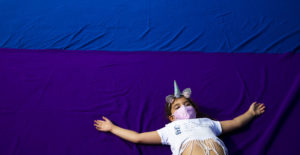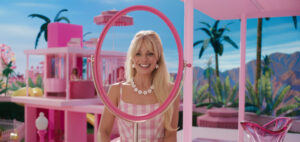In 1995, a girl named Emily Brown raised her hand during our pre-high school anti-bullying presentation. “Excuse me,” she said, smiling serenely at the guest speaker: “I think you should know, it’s just not like that in our class. We don’t bully people, and we don’t have cliques! People just have their own groups of friends, and I mean, it’s not like we can be friends with everyone.”
I have no idea what the presenter said in response. I was too busy having a flashback to a moment from gym class earlier that week: I’d been running laps around the soccer field when a gaggle of girls suddenly came up from behind and surrounded me, like a pride of lions circling a gazelle. One of them, the ringleader, took up a position just over my right shoulder. “Roses are red, violets are black, Rosenfield’s chest is as flat as her back,” she hissed — then drove an elbow into my ribs and laughed uproariously as I stumbled and faceplanted into the grass.
The girl who did this was, of course, Emily Brown.
The bully-in-denial is a recurring phenomenon in the work of Rosalind Wiseman, author of the 2002 parenting book Queen Bees and Wannabes. In her presentations on cliques and bullying, Wiseman would invariably be challenged by one girl who insisted that her services were not needed — and this, Wiseman explained, was your queen bee. “Without exception, three things will be true about this girl,” she wrote. “First, she’ll always be one of the meanest, most exclusive girls in the room; second, she honestly believes what she’s saying; and third, her parents will be in total denial about how mean she is and completely back her up.”
Queen Bees and Wannabes was an insightful analysis of the brutal dynamics of what Wiseman calls “Girl World”, a land of ferocious intrasexual competition and social aggression. It was also the source material for the 2004 film Mean Girls, in which Tina Fey transformed Wiseman’s first-person research and parenting advice into a scathing satire of American teen social life in the Y2K era. The film entered the canon not only thanks to its comedy and quotability, but its familiarity to a millennial audience who had lived the dynamics Wiseman had documented, and still bore the scars of their own recent journeys through Girl World. I was 22 by the time the movie came out, but when the villainous Regina George stood up at her school’s anti-bullying assembly and said, “Can I just say that we don’t have a clique problem at this school? And some of us shouldn’t have to take this workshop, because some of us are just victims in this situation,” I cackled in recognition: Oh my god, it’s Emily Brown.
If Mean Girls was a hit in 2004 because it captured the darkly funny truth about how savage and Machiavellian the socially ambitious teenage girl can be, the new musical reboot of the movie hints at our increasingly uneasy relationship with that truth. Just as Disney has lately tried to complicate its fairytale villainesses by giving them sympathetic origin stories, Mean Girls 2024 traffics in facile YASS-KWEEN-ing feminism that gives meanness an implicit pass. Here, Regina George is a victim of sexism rather than a powerful social terrorist in her own right. After all, the movie asks, would anyone have a problem with her horrible, grasping behaviour if she were a man?
In the original Mean Girls — as in Wiseman’s book, and as in life — Regina George’s weaselly claim to be one of the “victims in this situation” is exposed for the howler it is when Tina Fey’s character asks: “How many of you have ever felt personally victimised by Regina George?” (Every hand in the room goes up.) Not so in the 2024 version, where Regina’s denial goes unchallenged. Much like the velour sweatsuits sported by the original Plastics, the inclination of Mean Girls to hold young women accountable for their cruelty seems to have gone out of style, and even Wiseman’s original research is no longer received as the universally relatable truth it once was. The cruel and cunning young woman who wields gossip as a weapon isn’t just something you see in the movies; she’s a human constant that transcends social construct, a raceless, classless, timeless phenomenon. The truth is, anyone can be a mean girl — but this truth does not jive easily with a contemporary, highly identitarian discourse in which villainy is seen as the sole purview of the privileged. In one recent New York Times article, a competing researcher dismisses Wiseman’s entire concept of the mean girl as racist, rooted in privilege, “a product of middle- to upper-class white girls”.
Personally, if I were the betting type, I’d wager my life savings that this researcher is one of Wiseman’s bullies-in-denial. But anyway: one can certainly see how for those who buy into this mode of cultural critique, Mean Girls becomes not just irrelevant but inscrutable. The oppressed-oppressor model sees no difference between the queen bee who rules with an iron fist, the sycophantic handmaidens who enable her reign, or the naive newbie who fears the queen bee’s meanness right up until the moment she exceeds it herself; they’re all cis, straight, able-bodied white women, so who cares?
Perhaps for this reason, the new Mean Girls makes a cursory effort to be more en vogue and intersectional: the character of Janis, who masterminds the movie’s central plot to take down Regina George, is not only updated in this version with multiple marginalisations, but also given the film’s first, last, and best words, including a sorry-not-sorry showstopper of a solo that outright celebrates her scheming. This might be the biggest change from the original Mean Girls, which was strong on insight while sparing its audience the insult of heavy-handed moralising. The message now, and it’s not exactly subtle, is that it’s fine, even heroic, to manipulate the people around you and destroy someone’s life if you feel she’s mistreated you… just as long as you’re a gold medallist victim in the oppression Olympics.
Advertised as “not your mother’s Mean Girls”, the film is, in this way, utterly in keeping with the mores of the present moment — if not in the Girl World ruled by teenagers, then among the adult millennial women who now reproduce its contours in their personal and professional lives. Wiseman herself has now pivoted in her work to addressing the phenomenon of the grown-up mean girl; even in ostensibly feminist spaces, it’s not unusual to witness the utter social destruction of one woman by another, with the aggression deemed permissible just as long as it’s aimed at an acceptable target by an acceptable perpetrator.
The young adult literary world in which I began my career is no exception, as I found out first-hand seven years ago, when a fellow author began spreading a laughably false but incredibly damaging rumour about me through my personal and professional circles. When I publicly asked that she stop, I was informed that because I was white and she was not, pointing out her misbehaviour was bullying her. A queen bee looks different in 2024 from how she did 20 years ago, but the perks of accruing that level of social capital remain the same, including the freedom to designate certain people as losers and then mistreat them accordingly — all while blithely claiming that there’s nothing toxic about any of this at all.
In this sense, the new Mean Girls both is and isn’t “your mother’s”. It’s not quite the same story, but it is the same idea — one that has evolved (I won’t say matured) alongside its core audience to give them what they want, over and over again. In 2004, the movie offered an unflinching and relatable portrayal of how girls acquire power by hurting each other on purpose. But when the tactics that allowed one to rule in Girl World are useful today to adult women who want to accrue real-world power, can we really indict them? The original Mean Girls, written in the age before social media, made it not just acceptable but socially lucrative to fight like a girl, but had the temerity to note that girl-on-girl social aggression is ultimately damaging to women as a class. The new movie takes a different view: it’s good to be the queen.
Part of the problem is that the new Mean Girls is a derivative of a musical that was a derivative of a film that was a derivative of a non-fiction parenting book, a copy of a copy of a copy that has lost its original sharpness; it has, to quote one reviewer, “mythologised the culture of gossip and backstabbing for a new generation”. In the public imagination, the queen bee has gone from an observable phenomenon to an archetype to a mythological figure. Soon, she’ll pass into legend; soon, people will forget she was ever real at all.
Mean girls? Pffft, that’s just an outdated stereotype, that’s white women’s nonsense, that’s not a thing that exists. In fact, can I just say: we don’t have a clique problem, and some of us shouldn’t have to take this workshop, because some of us are just victims in this situation.
Disclaimer
Some of the posts we share are controversial and we do not necessarily agree with them in the whole extend. Sometimes we agree with the content or part of it but we do not agree with the narration or language. Nevertheless we find them somehow interesting, valuable and/or informative or we share them, because we strongly believe in freedom of speech, free press and journalism. We strongly encourage you to have a critical approach to all the content, do your own research and analysis to build your own opinion.
We would be glad to have your feedback.
Source: UnHerd Read the original article here: https://unherd.com/




